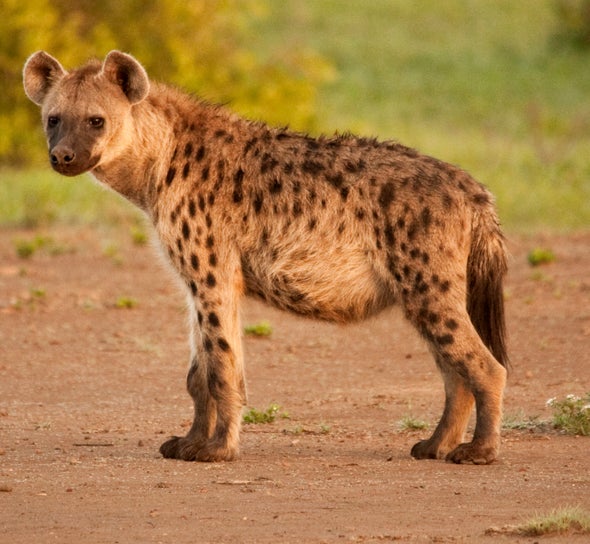(单词翻译:单击)
听力文本
This is Scientific American — 60-Second Science. I'm Jason Goldman.
Turns out that for hyenas, it's not what you know, but who you know.
Spotted hyenas live in large, mixed-sex clans with fairly stable social hierarchies—and the females are in charge.
"The matrilineal hierarchies that we see in spotted hyenas are also found in a lot of Old World monkeys."
Michigan State University biologist Eli Strauss.
"It's been perplexing for a long time to a number of people: what forces maintain this system? Because it is somewhat unusual in the animal kingdom."
In some kinds of animal societies, your place in the dominance hierarchy can be explained by physical attributes like body size. But in other animals, dominance rank can be acquired through things like age or nepotism.

Strauss and colleagues collected data about five generations of four groups of wild spotted hyenas in Kenya that they observed over a 27-year period. And the researchers saw multiple instances in which a smaller hyena came to dominate a larger one. They've even seen severely wounded hyenas become dominant to healthy ones. The results are in the journal Proceedings of the National Academy of Sciences.
Given those examples, it would seem that rank in spotted hyenas is fairly arbitrary. But it turns out that what researchers call "rank reversals" happen only rarely in this species—just 14 percent of the time. So how does it stay so stable over time?
"They're systematically related to the coalitionary support that we observed...So females who had stronger coalitions with their top allies were more likely to increase their social rank."
Spotted hyenas could only climb the social ladder if they were able to maintain a strong alliance.
"The social bonds of these animals are really very fundamental in establishing the structure of their societies."
In other words, the strength of relationships is what puts one hyena in its group's spotlight.
Thanks for listening for Scientific American — 60-Second Science. I'm Jason Goldman.
参考译文
这里是科学美国人——60秒科学。我是杰森·古德曼。
事实证明,对于鬣狗来说,重要的不是知道什么,而是你认识谁。
斑点鬣狗生活在大型的雌雄混居的家族中,这种家族的社会等级相当稳定,而且由雌性主导。
“我们在斑点鬣狗身上看到的是母系等级制度,这在许多东半球的猴子身上也发现过。”
密歇根州立大学的生物学家伊莱·斯特劳斯说到。
“长期以来,令许多人困惑的是:什么力量维持着这种制度?因为这在动物界有些不同寻常。”
在某些动物社会中,你在权力等级中的地位可由体型等身体特征来决定。但在其他动物中,社会等级会通过年龄或裙带关系来获得。
斯特劳斯和同事对肯尼亚四组野生斑点鬣狗的五代进行了27年的观察,并收集了数据。研究人员观察到了许多小鬣狗统治大鬣狗的案例。他们甚至看到了严重受伤的鬣狗成为健康鬣狗主宰的情况。研究结果发表在《美国国家科学院院刊》上。
从这些例子来看,斑点鬣狗的等级排列似乎相当随意。但事实证明,研究人员所说的“等级逆转”现象在斑点鬣狗中很少发生——只有14%的几率。那这种制度是如何随时间保持稳定的呢?
“这些等级排列与我们观察到的联盟支持有系统联系……因此,与上层联盟关系更强的雌性,更可能提升自已的社会地位。”
斑点鬣狗只有维持强大的联盟才能登上更高的社会等级。
“这些动物的社会联系对于建立它们的社会结构来说非常重要。”
换句话说,正是这种强大的关系让一只鬣狗成为了团队的焦点。
谢谢大家收听科学美国人——60秒科学。我是杰森·古德曼。
译文为可可英语翻译,未经授权请勿转载!
重点讲解
重点讲解:
1. turn out 原来是;结果发现;
Cosgrave's forecast turned out to be quite wrong.
科斯格雷夫的预测最后证明是大错特错。
2. in charge 主管;全面负责;统领;
Until the doctor arrived from elsewhere on the ward, Amy was in charge.
在医生从别处赶到病房前,这里由埃米负责。
3. be able to do sth. 可以…的,能够…的;
It must be better to be able to offer them love and security.
要是能给予他们关爱和安全感肯定会更好。
4. in other words 换言之;换句话说;也就是说;
In other words, american literature is to our eyes a curious amalgam of familiar and strange.
换句话说,我们认为,美国文学把我们所熟悉的和陌生的东西奇妙地结合起来了。


